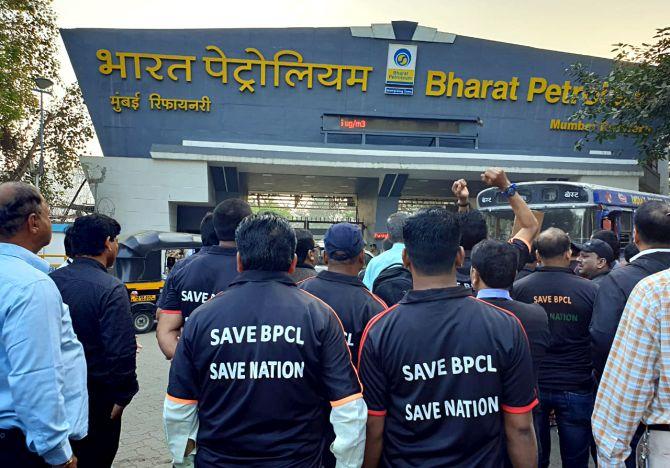Delays in due diligence, policy opacity and now the Ukraine crisis have brought the process to a near-standstill.
Shine Jacob reports.

In December 2019, the India arm of Deloitte Touche Tohmatsu surprised many with its ultra-competitive bid to become the transaction advisor for the country’s largest strategic divestment in Bharat Petroleum Corporation (BPCL).
The multinational major quoted just Rs 1; the second-highest bidder, SBI Caps, reportedly quoted Rs 15-17 crore.
For Deloitte, the motivation was to bag a prestigious deal adding a national energy company to its portfolio.
No doubt, it expected BPCL to go to a marquee buyer in quick time.
But 27 months later, in March 2022, the much hyped deal was stuck.
Procedural snags slowed the process initially; now the Ukraine crisis has complicated matters to an extent that a deal on BPCL is unlikely to happen anytime soon.
According to a source, the government “may consider coming out with a revised expression of interest (EoI)”, that may either offer less than the current 52.98 per cent stake or separate the refining and retail businesses and offer them as discrete units.
Neither the government nor BPCL has issued an official communication, while the Budget did not mention the issue.
This inactivity is not on account of a lack of investor interest.
Billionaire Anil Agarwal’s Vedanta, Apollo Management and THINK Gas, promoted by I Squared Capital, have all made overtures.
But, a company official pointed out that in the last six months, nothing happened in terms of physical due diligence of BPCL.
“None of the prospective bidders have visited our units or asked any questions as of now,” the source added, though prospective bidders had access to the refiner’s financial data almost a year back.
The government has said BPCL’s due diligence is yet to be completed.
This step is critical because the transaction advisers can invite financial bids through request for proposal (RFP) documents to qualified shortlisted bidders only after due diligence is completed.
The transaction adviser and asset valuer will submit their independent valuation reports in sealed covers, which will determine the reserve price only after the process of financial bidding is complete.
What explains this tepid response?
One major roadblock is the lack of clarity with regard to the government control on prices.
With the current volatility in international prices, experts indicate none of the serious bidders will be keen unless the government clarifies on its control over fuel prices.
Recent developments underline their apprehensions.
Ahead of Assembly elections in Uttar Pradesh, Punjab, Uttarakhand, Goa and Manipur, fuel prices remained untouched for almost 4.5 months (since November), putting pressure on the state-owned oil marketing companies.
The prices of international crude at that time were around $82 a barrel against $103 levels today.
A report by Moody’s Investors Services added that state-owned refining and marketing companies may be unable to fully pass on the recent spike in crude oil prices to the final consumer.
“As a result, profitability will weaken. Higher crude oil prices also increase refiners’ working capital requirements resulting in incremental borrowings and weaker credit metrics,” it added.
“Oil marketing companies were losing Rs 15-20 a litre on prices at one point. How can a private player sustain operations if it is unable to sell the product at the price they want?
"Existing private players are managing because they hedge domestic sales against exports,” said a senior industry expert in terms of anonymity.
Global sanctions against Russia would be another cause of concern for a global player because BPCL has upstream oil and gas assets in Russia.
Moody’s indicated that import bans and international sanctions on Russia may constrain the future cash flow-generating capacity of these assets and lead to impairment losses for the companies.
A company official added, “We can blame the delay on Covid for only six months.
"After that lack of interest by the investors resulted in the delay.”
Also, with the government announcing aggressive targets for electric vehicles by 2030, the future of a company like BPCL is not clear before a prospective bidder.
“If the government is talking about decarbonisation, it should mention the future of BPCL, too, in such a scenario.
"This may be the reason why big players like Saudi Aramco stayed away from the process,” the official pointed out.
Industry experts are also not keen on the option of separating marketing and refining businesses for sale.
Sources say that such revised expressions were floated multiple times in the case of Air India, too.
“If marketing and refining are not integrated it will not make sense for a buyer.
"Moreover, a lot of common infrastructure is shared between BPCL and other oil PSUs. Why will an IOC share its infrastructure with a private player? These questions are still unanswered,” said one of them.
Based on the current market cap of Rs 81,173 crore, the value of the 52.98 per cent stake in the company is expected to be around Rs 43,000 crore.
But with so many uncertainties, including a war, the plan for divestment of BPCL is likely to stay on the slow track.











